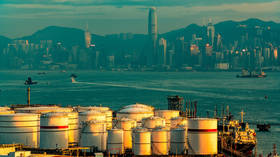Anti-Russia sanctions haven't worked – WaPo

Six months since unprecedented sanctions were slapped on Russia, the country’s economy has still not shown any signs of the collapse that Western leaders had initially expected, a leading US newspaper has assessed.
An editorial published on Tuesday in the Washington Post recounts how soon after the US introduced the restrictions against Russia in response to its military offensive against Ukraine, President Joe Biden claimed that the country’s economy was already “crater[ing]” and “reel[ing].”
However, as the article points out, following the initial shock, Russia’s currency, the ruble, managed to bounce back thanks to Moscow imposing strict curbs on foreign-currency transactions and also due to falling imports. Moreover, the unemployment rate in the country has not risen sharply and energy exports continue to bring billions of dollars into the Kremlin’s coffers every month, according to the Post.
The piece went on to cite the International Monetary Fund’s latest forecast that Russia’s economy will contract by 6% this year, a significant upgrade from the earlier 10% projection.
The article quoted Maxim Mironov, a Russian economist at IE Business School in Madrid, who argued that sanctions “are working, definitely, but unfortunately much slower than everybody was expecting six months ago.”
The expert stressed that the European Union banning Russian gas and oil imports would be a tangible blow to Moscow. However, as the article notes in the same breath, much of Europe is heavily dependent on Russian energy, which makes such a scenario less likely.
Nevertheless, Russia’s economy has not exactly emerged completely unscathed, according to the Post. Apart from the departure of some popular brands and higher coffee prices, the country’s car manufacturers have had to considerably scale back production and furlough workers due to a lack of imported components, the article notes. It also points out that pilots and other airline employees have been laid off en masse, too, as a result of Western sanctions, while thousands of highly educated professionals have fled the country.
Quoting Ilya Matveev, a political scientist in St. Petersburg, the Post concludes that the “technological gap between Russia and the advanced economies will widen over time” with little chance of “innovative and technological advancement” in the country.













